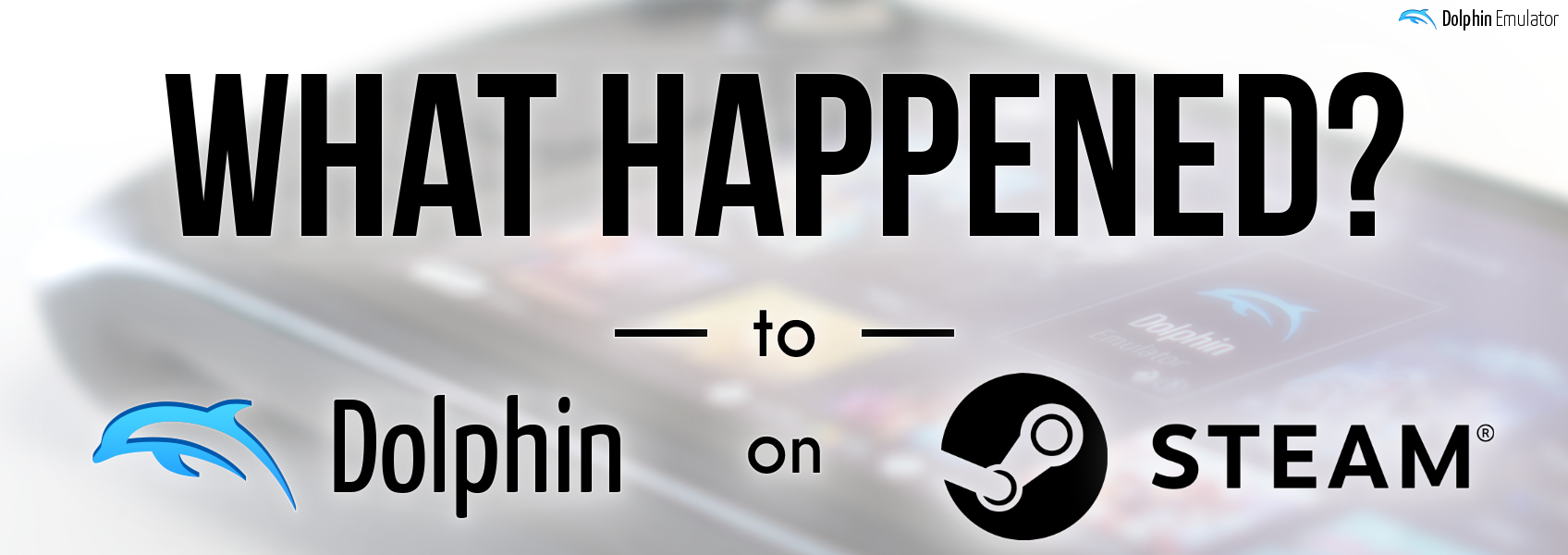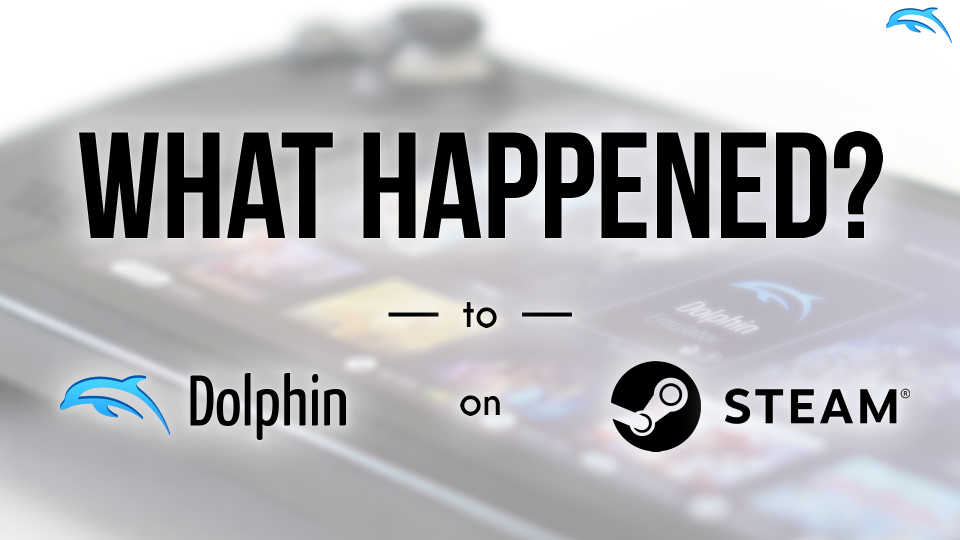

Well that blew up, huh? If you follow emulation or just gaming on the whole, you've probably heard about the controversy around the Dolphin Steam release and the Wii Common Key. There's been a lot of conclusions made, and while we've wanted to defend ourselves, we thought it would be prudent to contact lawyers first to make sure that our understanding of the situation was legally sound. That took some time, which was frustrating to ourselves and to our users, but now we are educated and ready to give an informed response.
We'd like to thank Kellen Voyer of Voyer Law for providing us with legal council for this matter. And to be clear, all of the analysis below is specifically regarding US law. Without further delay, let's begin.
What actually happened?¶
First things first - Nintendo did not send Valve or Dolphin a Digital Millenium Copyright Act (DMCA) section 512(c) notice (commonly known as a DMCA Takedown Notice) against our Steam page. Nintendo has not taken any legal action against Dolphin Emulator or Valve.
What actually happened was that Valve's legal department contacted Nintendo to inquire about the announced release of Dolphin Emulator on Steam. In reply to this, a lawyer representing Nintendo of America requested Valve prevent Dolphin from releasing on the Steam store, citing the DMCA as justification. Valve then forwarded us the statement from Nintendo's lawyers, and told us that we had to come to an agreement with Nintendo in order to release on Steam. Considering the strong legal wording at the start of the document and the citation of DMCA law, we took the letter very seriously. We wanted to take some time and formulate a response, however after being flooded with questions, we wrote a fairly frantic statement on the situation as we understood it at the time, which turned out to only fuel the fires of speculation.
So, after a long stay of silence, we have a difficult announcement to make. We are abandoning our efforts to release Dolphin on Steam. Valve ultimately runs the store and can set any condition they wish for software to appear on it. But given Nintendo's long-held stance on emulation, we find Valve's requirement for us to get approval from Nintendo for a Steam release to be impossible. Unfortunately, that's that. But there are some more serious matters to discuss, some that are much bigger than Dolphin's Steam Release.
What about the key?¶
Over the past few weeks, a lot has been said about Dolphin including the Wii Common Key. As you may know, Wii games are encrypted, and the Wii uses the "common key" that is burned into the console to decrypt Wii discs. Wii software does not have any access to the key whatsoever, however, some smart engineers and a pair of tweezers was all it took to extract the key. If you haven't heard this story before, we highly recommend checking out the 25c3 presentation on the actual Tweezer Exploit that gave Team Twiizers its original name. It's an incredibly entertaining video that's worth your time. If you aren't familiar with Team Twiizers, perhaps you know them under their modern name: fail0verflow.
The extraction of the Wii Common Key did not elicit any kind of legal response from anyone. It was freely shared everywhere, and eventually made its way into Dolphin's codebase more than 15 years ago (committed by a Team Twiizers member no less).
These keys have been publicly available for years and no one has really cared. US law regarding this has not changed, yet a lot of armchair lawyers have come out talking about how foolish we were to ship the Wii Common Key. Fueling this is Nintendo's letter to Valve, which cites the anti-circumvention provisions of the DMCA (17 U.S.C. § 1201), particularly because Dolphin has to decrypt Wii games.
Wii and Nintendo GameCube game files, or ROMs, are encrypted using proprietary cryptographic keys. The Dolphin emulator operates by incorporating these cryptographic keys without Nintendo’s authorization and decrypting the ROMs at or immediately before runtime. Thus, use of the Dolphin emulator unlawfully “circumvent[s] a technological measure that effectively controls access to a work protected under” the Copyright Act. 17 U.S.C. § 1201(a)(1). Distribution of the emulator, whether by the Dolphin developers or other third-party platforms, constitutes unlawful “traffic[king] in a[] technology . . . that . . . is primarily designed or produced for the purpose of circumventing a technological measure . . . .” 17 U.S.C. § 1201(a)(2)(A).3
This sounds extremely bad at a glance (and we certainly had a moment of panic after first reading it), but now that we have done our homework and talked to a lawyer, we are no longer concerned.
We have a very strong argument that Dolphin is not primarily designed or produced for the purpose of circumventing protection. Dolphin is designed to recreate the GameCube and Wii hardware as software, and to provide the means for a user to interact with this emulated environment. Only an incredibly tiny portion of our code is actually related to circumvention. Additionally, GameCube games aren't actually encrypted at all, and Dolphin can also play homebrew and is used in the development of game mods. There are even homebrew and mods that specifically target Dolphin as its own platform, given that it has the ability to emulate more memory and processing power than is possible on the original consoles. That's why there are "Dolphin modes" in many modern homebrew games!
Considering that only a small fraction of what we do involves circumvention, we think that the claim that we are "primarily for circumvention" is a reach. We do not believe this angle would be successful in a US courtroom, if it were ever to come to that. The reason the lawyers representing Nintendo would make such a leap is because they wished to create a narrative where the DMCA's exemptions do not apply to us, as these exemptions are powerful and widely in our favor. Of particular note for Dolphin is the reverse engineering exemption in 17 U.S.C. § 1201(f) which states that:
...a person may develop and employ technological means to circumvent a technological measure, or to circumvent protection afforded by a technological measure, in order to enable the identification and analysis under paragraph (1), or for the purpose of enabling interoperability of an independently created computer program with other programs, if such means are necessary to achieve such interoperability, to the extent that doing so does not constitute infringement under this title.
Dolphin is an independently created computer program that is circumventing Wii disc encryption for interoperability with Wii software. According to this exemption, this does not constitute infringement under 17 U.S.C. § 1201. This exemption even allows distribution of information collected through circumvention, like encryption keys, if it is for software interoperability.
The information acquired through the acts permitted under paragraph (1), and the means permitted under paragraph (2), may be made available to others if the person referred to in paragraph (1) or (2), as the case may be, provides such information or means solely for the purpose of enabling interoperability of an independently created computer program with other programs, and to the extent that doing so does not constitute infringement under this title or violate applicable law other than this section.
17 U.S.C. § 1201(f) is a significant legal protection for emulation in the US, and it is why Nintendo has yet to legally challenge any emulator with the DMCA anti-circumvention clauses despite the law going into effect 25 years ago. Unless a court rules that our understanding of the law is incorrect, we have every reason to believe that our decryption of Wii game discs is covered by this exemption.
After this situation blew up, we received many requests, and even some demands, to remove all Wii keys from our codebase. We're disappointed that so many people on YouTube and social media didn't even consider that maybe the team had done their research and risk analysis before including the keys, and just assumed that now that it was "pointed out to us" we would remove them. However, we do not think that including the Wii Common Key actually matters - the law could easily be interpreted to say that circumventing a Wii disc's encryption by any means is a violation. As such, it is our interpetation that removing the Wii keys would not change whether the exemption in 17 U.S.C. § 1201(f) applies to us or not.
In fact, we think that offloading decryption tasks onto a potential 3rd party application would make the situation worse for everyone. As such, we believe leaving the keys as they are is the best course of action.
And to all the armchair lawyers out there, the letter to Valve did not make any claims that we were violating a US copyright by including the Wii Common Key, as a short string of entirely random letters and numbers generated by a machine is not copyrightable under current US copyright law. If that ever changes, the world will be far too busy to think about emulation.
What happens now?¶
We do not believe that Dolphin is in any legal danger. We can look to the end of the message Valve forwarded to us to show this. After all of the scary language, Nintendo made no demands and made only a single request to Valve.
We specifically request that Dolphin’s “coming soon” notice be removed and that you ensure the emulator does not release on the Steam store moving forward.
In the end, Valve is the one running the Steam store front, and they have the right to allow or disallow anything they want on said store front for any reason. As for Nintendo, this incident just continues their existing stance towards emulation. We don't think that this incident should change anyone's view of either company.
As a silver lining, some of the features being developed for the Steam release will still work in Dolphin's normal builds, and are still being developed. One of the features we are most excited for is a full "Big Picture" GUI that can be used directly with a controller. That is still going to happen regardless of a Steam release, alongside several smaller features that were meant to be quality of life improvements for Steam builds.
The last thing we'd like to do before signing off is thank the developers who put a lot of effort into the Steam release. OatmealDome in particular was the architect of Dolphin's Steam Integration, working with Dolphin's infrastructure and Steam to take it from theory all the way to a fully-functional version of Dolphin. We'd also like to thank delroth for the immense amount of CI work the past few months, which gave OatmealDome a solid foundation to build from. Finally, MayImilae put in a large amount of media work toward the Steam release despite also working on a major upcoming feature.